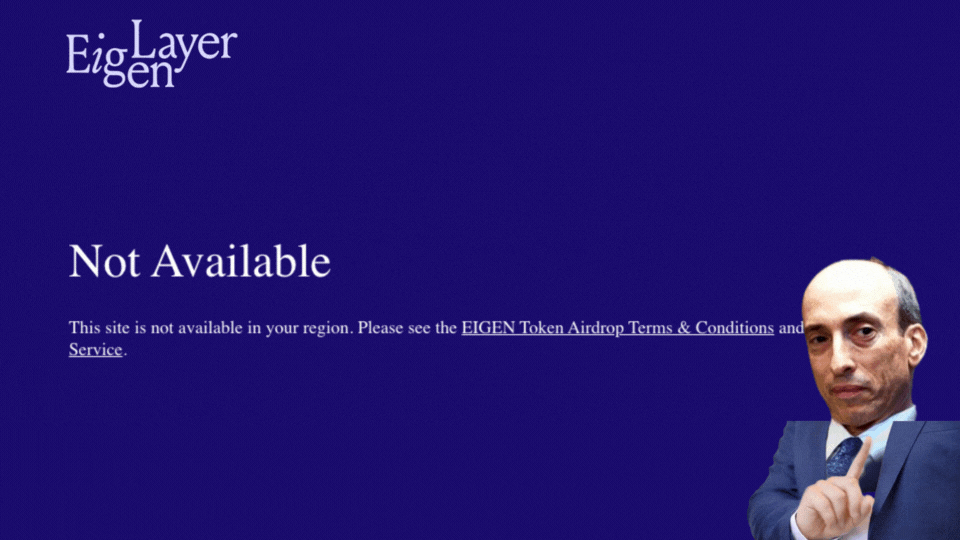News
Your free tokens are not available

The release of the EigenLayer token was announced on Monday, but many users around the world were unhappy that the EIGEN request page was “Unavailable” for them!
Who can’t complain?
Not only are residents of a large list of nations, including the United States, prohibited from claiming EIGEN, but the complaint site explicitly prevents users from interacting with the frontend via VPN or other proxy technologies!
The extensive list of countries excluded from the EIGEN drop.
This restriction came as a shock to some existing users due to the unrestricted access to the EigenLayer frontend and protocol-limited communication about their plans for aggressive geo-blocking.
While EigenLayer is not the first protocol to pursue some of these limitations in token distribution, the massive EIGEN opportunity is driving users in affected geographies wonder whether they will continue to be shut out of future earnings until regulators get their act together.
The new normal for Airdrops?
Considering the hostile and unclear regulatory environment in which cryptographic protocols are forced to operate, disappointments such as restrictions on EIGEN claims are becoming increasingly common.
Amid the lack of clear guidance from existing statutes and the refusal of US financial system regulators to provide satisfactory guidelines for digital assets, protocol operators and token issuers are left guessing how to best avoid scrutiny of agencies such as the SEC.
This lack of regulatory clarity has infested every corner of the cryptocurrency industry, making it extremely difficult for users to access cryptographic protocols and often preventing users from accessing the free money that their onchain interactions entitle them to claim.
presented without comment pic.twitter.com/KtGLwmqEKF
— President Birb Bernanke (@Bonecondor) April 29, 2024
Since the presence of token distributions to American (and sanctioned) users can easily place cryptographic protocols under the jurisdiction of various American regulators, the projects often block IP addresses coming from America and nations sanctioned by the Office of Foreign Asset Control (OFAC).
While teams had historically sought to mitigate potential liability by simply banning IP addresses from restricted nations, a September 2023 agreement struck between the Commodities Futures Trading Commission (CFTC) and DeFi derivatives platform Opyn indicates that regulators they believed their IP blocking was insufficient to ban users from accessing the platform, placing it under the jurisdiction of US regulators.
🚨 BREAKING: the CFTC announces THREE ENFORCEMENT ACTIONS against @opyn_, @0xProjectAND @DeridexHQ
DeFi in the US is in danger! Will DeFi frontends soon be forced to block US users?
The CFTC has taken full advantage of tokens in its… pic.twitter.com/tsY6yrAg4n
— Bankless (@BanklessHQ) September 7, 2023
This approach is not unique to EigenLayer and has been adopted for numerous airdrop distributions, such as Celestia’s TIA, and implemented by some bluechip protocols to prevent unauthorized access to their frontends, including MakerDAO’s Spark lending protocol.
To minimize the possibility of American regulators targeting their projects while still preserving access to their decentralized protocol and maintaining the ability to launch tokens, many projects have now resorted to outright bans on VPNs, eliminating any possibility that users from restricted countries can access their products.
Thankfully, there are still possibilities for restricted users to access these protocols, either by directly interacting with onchain smart contracts or by physically changing their location, but unfortunately it seems very likely that the strict combination of geoblocking and VPN restriction will be the norm for the world. most token issuers in the future.
Airdrop hunters would be keen to anticipate and prepare for geo-restrictions on token request whenever they engage in early-stage projects, regardless of whether they can interact with the underlying protocol via its frontend.
